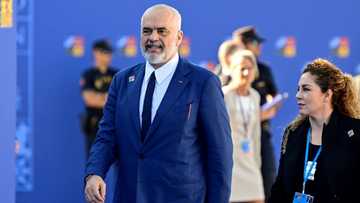Germany 'regrets' Iran failure to agree to nuclear deal

Source: AFP
PAY ATTENTION: Click “See First” under the “Following” tab to see Legit.ng News on your Facebook News Feed!
German Chancellor Olaf Scholz Monday ruled out the revival of a nuclear deal with Iran "in the near future", as Israel pushed for a "credible military threat" to pressure Tehran.
Scholz's sombre assessment came during Israeli Prime Minister Yair Lapid's visit -- his latest diplomatic effort to persuade Western powers to ditch the agreement with the Jewish state's arch nemesis.
Israel has long opposed a revival of the 2015 accord that seeks to tame Tehran's nuclear ambitions.
The agreement has been moribund since then US president Donald Trump unilaterally withdrew in 2018 and reimposed biting sanctions on Tehran.
Momentum that built towards a restored agreement last month has stumbled, with the three European nations party to the agreement -- Germany, France and Britain -- expressing doubts about Iran's sincerity over the weekend.
Speaking alongside the Israeli leader in Berlin, Scholz said he regretted that Iran "has not yet given a positive response to proposals" from the Europeans.
PAY ATTENTION: Share your outstanding story with our editors! Please reach us through info@corp.legit.ng!
"There is now actually no reason for Iran not to agree to these proposals. But we have to note that this is not the case, and will not happen certainly in the near future."
Lapid said it was "time to move past the failed negotiations with Iran.
"They cannot and will not achieve the goal we all share to stop Iran from getting a nuclear weapon."
A senior Israeli official said that everyone was asking them what comes next in terms of the nuclear deal.
"It is time to have a dialogue with the Americans and the Europeans... to put on the table a credible military threat to pressure Iran into a better deal", than just returning to the JCPOA, said the official.
The 2015 agreement, known formally as the Joint Comprehensive Plan of Action (JCPOA), gave Iran sanctions relief in return for restricting its nuclear programme.
Negotiations underway in Vienna since April 2021 have sought to restore the agreement, by lifting the sanctions on Tehran and pushing Iran to fully honour its prior nuclear commitments.
'Critical diplomatic opportunity'
In a joint statement at the weekend, Germany, France and Britain charged that Tehran "has chosen not to seize this critical diplomatic opportunity".

Source: AFP
"Instead, Iran continues to escalate its nuclear programme way beyond any plausible civilian justification", it added.
Iran's foreign ministry criticised those comments as "unconstructive."
Further complicating efforts to revive the deal, the UN nuclear watchdog said in a report last week that it "cannot assure" the peaceful nature of Tehran's nuclear programme.
Iran on Monday reaffirmed its "readiness" to cooperate with the International Atomic Energy Agency.
Before flying to Berlin, Lapid told his cabinet that "Israel is conducting a successful diplomatic campaign to stop the nuclear agreement and prevent the lifting of sanctions on Iran.
"It is not over yet," he added. "There is still a long way to go, but there are encouraging signs."
As well as Scholz, Lapid met Foreign Minister Annalena Baerbock and President Frank-Walter Steinmeier in Berlin.
Israel insists Iran would use revenue from sanctions relief to bolster allied groups capable of attacking Israelis.
These groups notably include Lebanese Shiite group Hezbollah as well as Hamas and Islamic Jihad, two key Palestinian militant organisations.
At a conference in the United States Monday, Israeli Defence Minister Benny Gantz presented a map showing 10 sites in Syria, including in Masyaf, that he said were used by Iran to produce weapons for Hezbollah.
Last month, the European Union, which acts as the mediator of the nuclear talks, put forward a "final" draft of the agreement.
Iran and the US then took turns to respond to the text, with Washington saying on Friday that Tehran's reply was a step "backwards".
Lapid, whose late father survived the Holocaust, is also travelling with a delegation of survivors who joined him and Scholz on a visit to Wannsee, site of a 1942 conference where top Nazi officials finalised plans to send Jews to death camps.
Source: AFP




